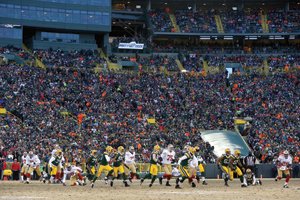Top industry executives say they are not concerned that the threatened TV blackouts for three of the NFL’s four wild-card playoff games mark the start of a trend.
Rather, these executives point to a series of extenuating circumstances that caused the league to grant an extension to allow a football-crazy market like Green Bay, for example, to sell the last of its tickets to corporate sponsors just two days before kickoff. Green Bay, Indianapolis and Cincinnati were the challenged markets. All three eventually sold enough tickets to avoid a blackout; however, their struggles became a news story across mainstream media, even hitting the morning news shows.
“I don’t think sellouts are a long-term problem, certainly not for the NFL playoffs,” Mark Lazarus, chairman of NBC Sports Group, told me last week. “This was an isolated experience based on a few strange factors.”
 |
In Green Bay, sub-zero temperatures and a change in ticket policy were just some of the factors in play.
Photo by: GETTY IMAGES
|
Lazarus was one of several executives who talked about this issue last week, though he was the only one to go on record. All the executives, who had business ties to the NFL, described the reaction to the potential blackouts as overblown, especially considering that the NFL’s regular-season attendance increased this year and it had only two local TV blackouts all season.
Let’s use Green Bay as an example. The Packers were mediocre most of the season, sneaking into the playoffs with an 8-7-1 record. The team beat Chicago in a win-or-go-home game the previous Sunday afternoon, meaning its fans did not know that the Packers would host a playoff game until just a few days before it needed to sell out. Weather forecasts for the game called for sub-zero temperatures at game time.
Media reports suggested the team also offended some of its season-ticket holders with a change in its ticket policy that did not guarantee a refund on tickets sold earlier in the season. If the Packers had not hosted a playoff game, the money would be credited to future season tickets rather than refunded.
“I think some of it is when and how they go about selling their tickets to season-ticket holders and regular fans,” Lazarus said, speaking of the league in general, rather than the Packers’ specific situation. “That’s one the teams have to wrestle with as times go by.”
I believe another factor deals with the hassles associated with attending games, something that has the potential to hurt attendance. What bigger indictment of the at-game experience than Titletown having trouble selling out a playoff game?
One of the dominant sports business issues over the past two years has been trying to improve the at-game experience by replicating in arenas what the leagues’ network partners do on TV. I felt this personally in October 2012, when the Orioles made the MLB playoffs. I was offered tickets to every game of the team’s first-round playoff series, in Baltimore and New York. I turned them all down. A longtime fan of the team, I preferred to watch from home and stay connected to my social media accounts and websites while watching the game.
Many pundits agree. The week Cincinnati, Green Bay and Indianapolis faced playoff blackouts, many media members cited the comfort of watching at home as a prime reason. When NBC’s Al Roker talks about “the flat-screen experience,” as he did on the “Today” show Jan. 3, it’s becomes an issue that has hit the mainstream.
League and team executives recognize this as a real issue and have been taking steps to address it, from increasing Wi-Fi capabilities to showing replays for the in-arena audience.
Lazarus said the changes are working.
“I’ve been in 15 stadiums this year for football games,” he said. “I think the in-arena experience for football is tremendous. You cannot replace that sense of community and spirit on TV. There’s 80,000 people a week that will gladly go watch their home football team. I have very high expectations that the in-stadium experience will never be replaced by television, even though the television experience is darn good.”
John Ourand can be reached at jourand@sportsbusinessjournal.com. Follow him on Twitter @Ourand_SBJ.





